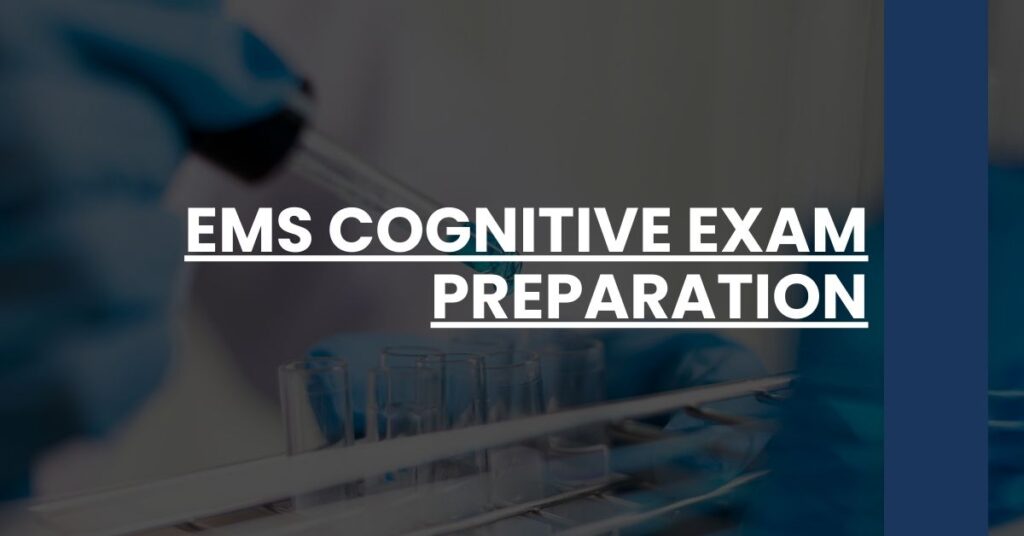Master EMS cognitive exam preparation with our focused strategies and expert insights.
- Effective Study Techniques: Tailored methods to boost your exam readiness.
- Resource Optimization: Leverage quality materials for comprehensive content coverage.
- Practice and Performance: Utilize mock exams to gauge and improve your proficiency.
Ensure success in your EMS cognitive exam prep with precision.
- Understanding the EMS Cognitive Exam
- Key Topics Covered in the Exam
- Study Materials and Resources
- Developing a Study Plan
- Test-Taking Strategies
- Practice Makes Perfect: Utilizing Mock Exams
- Mental and Physical Health Considerations
- Joining Study Groups and Forums
- Navigating the Exam Day
- After the Exam: Interpreting Results and Next Steps
- Conclusion: Embracing the Journey to Certification
Understanding the EMS Cognitive Exam
The EMS cognitive exam is a critical step on your journey to becoming a certified emergency medical service professional. It’s designed to assess not just your knowledge, but also your ability to apply that knowledge in various scenarios you’ll encounter in the field.
What’s on the EMS Cognitive Exam?
Key aspects of the cognitive exam include:
- Exam Structure: Comprehensive, computer-based testing ensures that your knowledge is up-to-date with the dynamic field of emergency medical services.
- Question Formats: Expect to encounter a mix of multiple-choice questions that evaluate your critical thinking and problem-solving skills.
- Primary Focus: Your ability to make quick, informed decisions in emergency medical scenarios is paramount.
Navigating through these elements requires a blend of solid knowledge, strategic thinking, and mental agility.
Key Topics Covered in the Exam
The broad range of knowledge tested can feel daunting, but focusing on core areas can streamline your preparation. Familiarize yourself with key domains that form the bedrock of the National EMS Education Standards:
- Airway, respiration, and ventilation
- Cardiology and resuscitation
- Trauma
- Medical and Obstetrics/Gynecology
- EMS Operations
These aspects are crucial, as they are the typical scenarios you will be confronted with on the field. Each section has its intricacies, and you’ll need to know them inside and out.
Study Materials and Resources
Compiling your study materials is akin to packing a well-stocked EMS kit—each item, a resource to help you save a ‘patient,’ your exam score.
Resources that should feature in your study plan include:
- Recommended Textbooks: Authoritative texts that provide in-depth coverage of EMS topics.
- Online Platforms like EMS pocket prep, which provide flexibility and convenience for test-takers.
- Practice Questions: Databases rich with scenarios to strengthen your critical thinking muscles.
These tools are your allies, and they’re indispensable for robust EMS cognitive exam preparation.
Developing a Study Plan
Approach your study plan with the precision of an EMS professional approaching a scene—you need a strategy, a clear head, and an understanding of your strengths and weaknesses.
Here are steps to craft a robust plan:
- Assess Current Knowledge: Identify your solid areas and those requiring more attention.
- Allocate Time Wisely: Designate study time for each exam topic, ensuring more time is spent on weaker areas.
- Set Milestones: These mini-goals will keep you motivated and on track.
The development and execution of an effective study schedule are non-negotiable. It’s your blueprint for success.
Test-Taking Strategies
Walking into your exam, you should carry with you more than just knowledge—you need a suite of strategies to navigate the complexity of the questions.
Crafting an approach includes:
- Time Management Techniques: These ensure you’re not rushed and can think through each question.
- Question Analysis: A method for breaking down complex scenarios and avoiding common pitfalls.
- Elimination Process: Kaplan’s expert advice includes excluding incorrect answers to improve your chances of selecting the right one.
Mastering these strategies is pivotal. They give you the poise to tackle each inquiry with confidence and ease.
Practice Makes Perfect: Utilizing Mock Exams
The adage “practice makes perfect” is never truer than when preparing for your EMS cognitive exam. Like training for a marathon, you can’t expect to perform well without running those miles—or in your case, taking those practice tests.
Why Mock Exams Are Critical
- Simulate Real Exam Conditions: Familiarize yourself with the exam’s structure and pacing to reduce anxiety on the big day.
- Highlight Weak Areas: Identify topics that need more attention, allowing you to refocus your study plan accordingly.
- Build Test-Taking Stamina: Conditioning yourself to think critically under exam duration helps maintain focus throughout the actual test.
Making the Most of Your Practice Sessions
To ensure your practice sessions are indeed making you exam-ready, consider the following steps:
- Time Yourself: Mirroring actual exam timings helps you manage the on-the-day pressure.
- Review Correct Answers: Don’t just check what you got right; understand why it is right. This deepens your knowledge and reinforces learning.
- Analyze Mistakes: Use errors as a learning opportunity; they can be even more instructive than successes.
You’ll find that the NREMT website’s sample exam questions mark a solid starting point for your practice tests. Remember, it’s about more than just going through the motions; it’s about learning from the experience.
Mental and Physical Health Considerations
Preparing for your EMS cognitive exam is a marathon, not a sprint—it requires a balance of mental agility and physical wellness. And just like any pre-routine for EMS fieldwork, your prep routine should incorporate strategies to keep you sharp and resilient.
Prioritizing Your Well-being
- Adequate Rest: Ensure you are well-rested; sleep is crucial for cognitive function enhancement.
- Balanced Diet: Nutritious meals fuel not only your body but also your brain, fostering better study sessions.
- Stress Management: Incorporate relaxation techniques such as deep breathing or yoga into your routine to maintain a calm, focused mindset.
Taking lessons from experts, like the straightforward recommendations on maintaining physical health, can be the difference between a frazzled exam day and a successful one.
Joining Study Groups and Forums
Collaborative learning has been shown to enhance understanding and retention. By joining study groups and forums, you intertwine your learning journey with peers who can offer different perspectives on complex problems.
Benefits of Collaborative Learning
- Shared Knowledge: Pooling resources and insights with peers can fill gaps in your understanding.
- Encouragement: A study group provides a support system, offering motivation when your resolve wanes.
- Accountability: Regular meetings with peers keep you accountable to your study goals.
You might find valuable dialogue and support through platforms like EMT Certification by Examination forums, where candidates share tips and clarify doubts.
Navigating the Exam Day
As your EMS cognitive exam nears, understanding the logistics of the exam day is just as important as your study content.
Preparation for the D-Day
- Know Your Venue: Familiarize yourself with the testing center location and commute time.
- What to Bring: Prepare all necessary identification and materials ahead of time, and know what is and is not permitted.
- Morning Routine: Follow a pre-exam routine that calms any nerves and sets you up for optimal performance.
This information could be found in detailed articles or state resources such as the Connecticut State Department of Public Health’s tips, which can help reduce any uncertainties about the test day itself.
After the Exam: Interpreting Results and Next Steps
Once the EMS cognitive exam is behind you, it’s time to reflect on your performance and contemplate the next steps in your career development.
Deciphering Your Exam Outcomes
- Understanding Scores: Grasp the significance of your results and what they indicate about your EMS knowledge level.
- Retake Policy: If your scores aren’t as expected, familiarize yourself with the retake policy and logistics so you can quickly strategize your next attempt.
Remember, whether it’s celebrating a pass or gearing up for a retake, each step is a progress marker on your path to becoming a qualified EMS provider.
Conclusion: Embracing the Journey to Certification
Your quest for EMS cognitive exam preparation is not just about memorizing protocols—it’s about adopting the role of a lifelong learner in the EMS community. Your certification is not just a professional gateway; it’s a testament to your dedication to saving lives and serving communities.
Remember:
- Education is Ongoing: The exam, while a milestone, is one of many in your EMS career.
- Resilience is Crucial: Persistence in the face of challenges will shape you into a more confident and competent EMS professional.
- Your Journey Counts: Each step of your preparation adds to your story, your expertise, and ultimately, the quality of care you will provide.
As you continue on your path, know that your efforts in EMS cognitive exam preparation are laying the groundwork for a rewarding, impactful career in emergency care.
EMS cognitive exam preparation is key. Follow these expert strategies to excel on your test and advance your EMS career.

